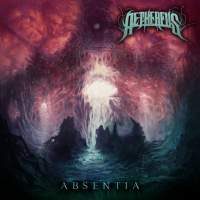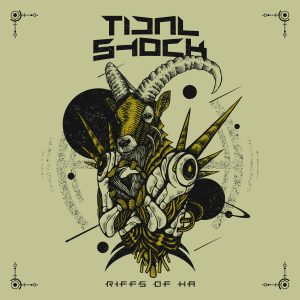[schema type=”review” name=”Aethereus – Absentia” description=”Label: The Artisan Era” author=”Sarp Esin” pubdate=”2018-08-10″ ]
Hailing from Washington, Aethereus first came onto the scene in 2013 under the name Seker. They soon changed their name and released the Ego Futurus EP in 2015. Come three years later, we get Absentia. What’s on offer here is tech-death: double-guitar attack that is a mile long, often both playing different-yet-similar melodies rather than riffing together (though harmonies are still there.) This is coupled with a dynamic bass that gallops and tumbles as often as it goes off on one. Competently played, heavy drums ground everything and guttural death growls ties the bow.
Might be obvious now, but: Absentia isn’t an album you can just listen once and figure out entirely. The winding riffs, the onslaught of technical passages, twin guitars going at full steam, tempo shifts and the fact that the album is practically bursting with unique melodies at every turn means that you need to be patient. Repeated listens are rewarded. This is due in part to never quite knowing what is going to happen. Take Writhe, for instance: it starts out with a solid riff, launches into a double-guitar assault before the guitars suddenly take a backseat to the bass. A definitive strength of Aethereus as a unit emerges here: the songs have impeccable, natural (though not always immediately obvious) flow. Even abrupt shifts feel part of a discernible whole, which is to say that the songwriting is damn good.
However, this does not in any way, shape or form excuse With You, I Walk, which is an ambient interlude that’s supposed to set up the epic finisher, The Pale Beast, which unfortunately doesn’t need it. Moving on.
Another reason for the patience Absentia requires lies in Aethereus’ love for changing things up. For instance, Flourescent Halls of Decay slows things down in favor of a heavier sound and stands out as the heaviest track on the record. Another example is That Which Was Left Behind which plays up the almost jazzy guitar licks for almost half the track, venturing into more atmospheric territories – something the rest of the album often struggles to generate. While the musicianship and skill displayed on the album is nothing to scoff at, it’s very atmosphere-light in general. This is hardly a bad thing in this context, but given that the band can, when so inclined, make a more immersive song, it’s a pity this component isn’t more prevalent.
While there are also a few issues with Absentia, they are nothing major. One of the more obvious ones is the presence of two interludes, both of which could be cut down and integrated into the track they are supposed to be opening seamlessly (Mortal Aborgation is especially guilty, since the build-up only happens in its last few bars.) A second issue is that the drumming, while rock-solid and well-suited for the material, is a bit unremarkable. While there is no shortage of fills, all too often the drums venture into djenty territories and so don’t really stand out as much as the other instruments. It’s anyone’s guess if this is a bad thing, though, because given that everything else has a tendency to wander off, a Ringo Starr-esque approach does somewhat balance the craziness.
So, what’s the verdict, you ask? Well, if you’re into tech-death or just the technical side of metal and love yourself some double guitar interplay, then Absentia should definitely be on your list. If you want to broaden your horizons of death sub-genres, then this is among the albums that can give you a primer. For others, you might want to prime your ears on technical metal first. Those looking for something quick and easy should also look elsewhere.
Line-Up
Vance Bratcher – Vocals
Kyle Chapman – Guitar/Vocals
Ben Gassman – Guitar
Scott Hermans – Bass
Matthew Behner – Drums










More articles
Veuve – Pole
Jerry Cantrell – I Want Blood
Tidal Shock – Riffs of Ha